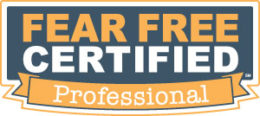 Barrie Finger, CDBC, has been professional dog trainer and behavior consultant in the Denver metro area for over 25 years. She is a Certified Dog Behavior Consultant with the International Association of Animal Behavior Consultants (IAABC.com), a Certified Fear Free Professional (www.fearfreepets.com), and completed the esteemed Living and Learning with Animals Course (behaviorworks.com).
Barrie Finger, CDBC, has been professional dog trainer and behavior consultant in the Denver metro area for over 25 years. She is a Certified Dog Behavior Consultant with the International Association of Animal Behavior Consultants (IAABC.com), a Certified Fear Free Professional (www.fearfreepets.com), and completed the esteemed Living and Learning with Animals Course (behaviorworks.com).
Barrie combines her deep desire to treat both dogs and their humans with appreciation, compassion and insight, with a dedication to continuing education to stay on top of best practices and more skillfully serve the needs of the families that come to her for support. She specializes in helping especially “sensitive” dogs and has a special interest in the connections between physical/medical and behavioral issues. Barrie is also an avid student of mindfulness and Buddhist philosophy and practice. She regularly encounters how these teachings intersect with the science of behavior in profound ways, and has found immense value, both personally and professionally, in how each perspective informs and supports the other.
Barrie’s training philosophy is firmly rooted in positive reinforcement, focusing on strengthening the relationship between dogs and humans to foster harmony and promote behavioral wellness. She is also co-founder of LIMA beings, a membership community of animal behavior professionals, trainers, other experts and enthusiasts.
She lives in Arvada, CO with her husband, Matt, and wonderdog and primary teacher, Tenzin. 
More info:
 “The IAABC promotes professionalism and continuing education in the field of animal behavior. Animal behavior consultants respect the client’s right to self-determination and embrace a non-judgmental approach. Our certified members are required to demonstrate competency in six core areas including assessment and intervention strategies, counseling skills, behavioral science, knowledge of animal behavior, and species-specific knowledge.”
“The IAABC promotes professionalism and continuing education in the field of animal behavior. Animal behavior consultants respect the client’s right to self-determination and embrace a non-judgmental approach. Our certified members are required to demonstrate competency in six core areas including assessment and intervention strategies, counseling skills, behavioral science, knowledge of animal behavior, and species-specific knowledge.”
www.iaabc.org
Fear Free Pets
 “Founded in 2016, Fear Free provides online and in-person education to veterinary professionals, the pet professional community, and pet owners. Our courses are developed and written by the most respected veterinary and pet experts in the world, including boarded veterinary behaviorists, boarded veterinary anesthesiologists, pain experts, boarded veterinary internists, veterinary technicians (behavior), experts in shelter medicine, animal training, grooming, boarding and more.
“Founded in 2016, Fear Free provides online and in-person education to veterinary professionals, the pet professional community, and pet owners. Our courses are developed and written by the most respected veterinary and pet experts in the world, including boarded veterinary behaviorists, boarded veterinary anesthesiologists, pain experts, boarded veterinary internists, veterinary technicians (behavior), experts in shelter medicine, animal training, grooming, boarding and more.
By closely listening to the needs of the profession and those of pet owners, Fear Free has become one of the single most transformative initiatives in the history of companion animal practice, providing unparalleled education on emotional well-being, enrichment and the reduction of fear, anxiety and stress in pets.”
Living and Learning with Animals: The Fundamental Principles and Procedures of Teaching and Learning

“Purpose and Objectives
LLA Professional is designed to provide the foundation for a comprehensive and coherent understanding of behavior analysis as it relates to facilitating the lives of captive and companion animals. The principles and procedures discussed throughout the class apply to all species. To meet this goal, the following objectives will be explored:
1) The fundamental principles of learning and behavior.
2) A model for assessing the functional relationships between behavior and environmental conditions.
3) The teaching technology of applied behavior analysis and its ethical guidelines for implementation.
4) A systematic model for building behavior-change interventions.
With this information, animal professionals will be able to better guide clients to proactively teach their animals successful captive and companion behaviors and effectively analyze and resolve behavior problems that inevitably arise.”
